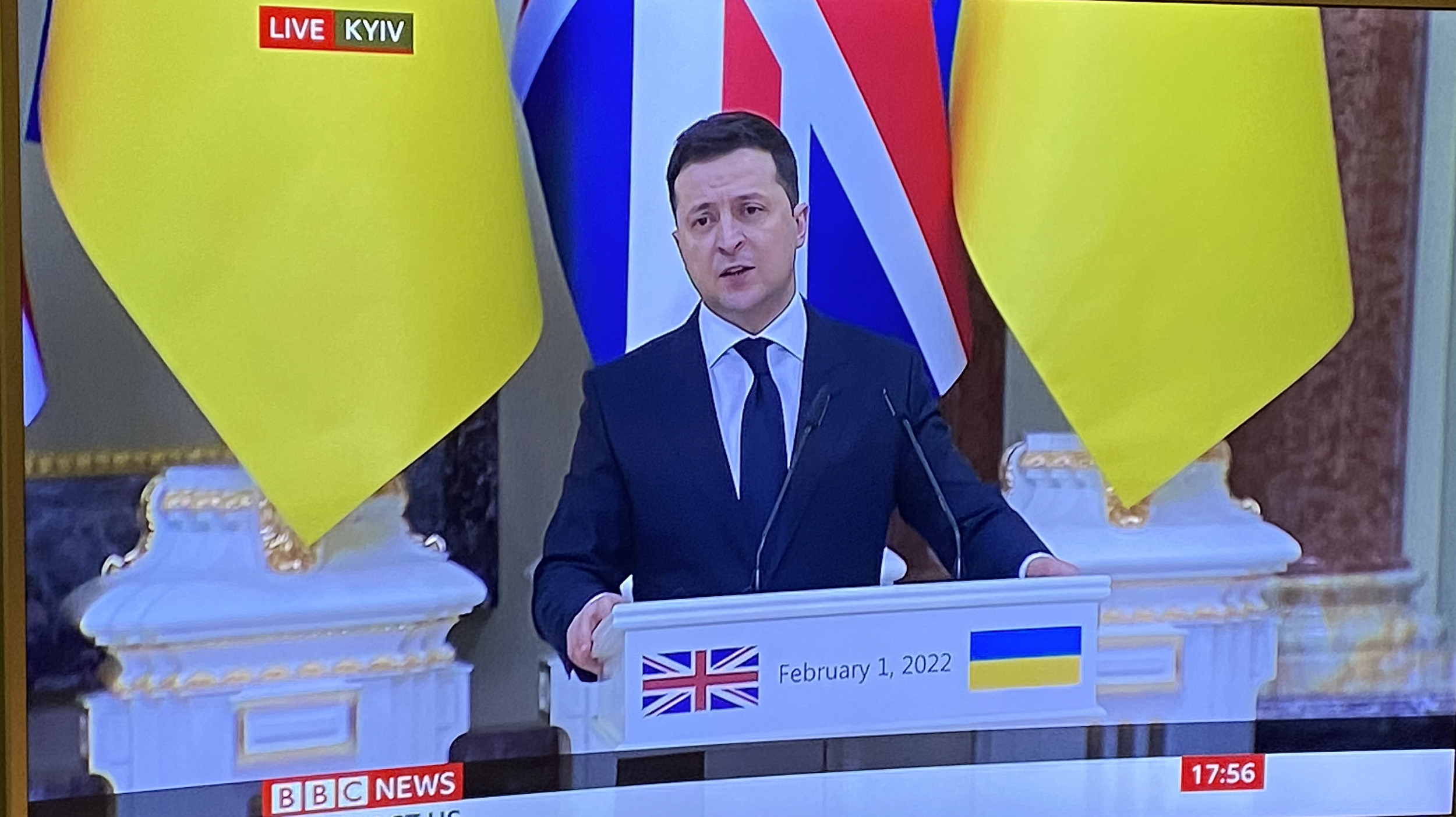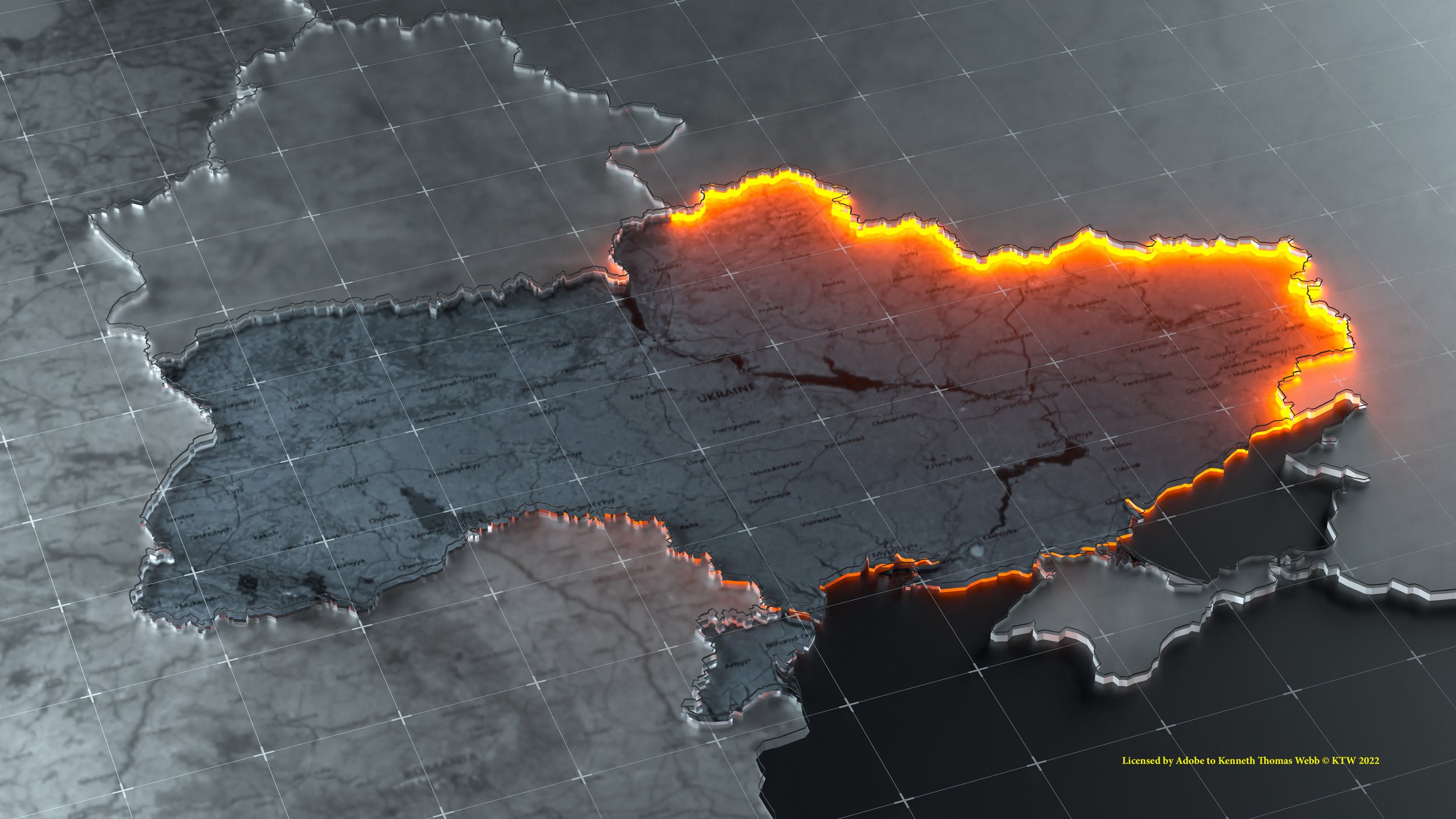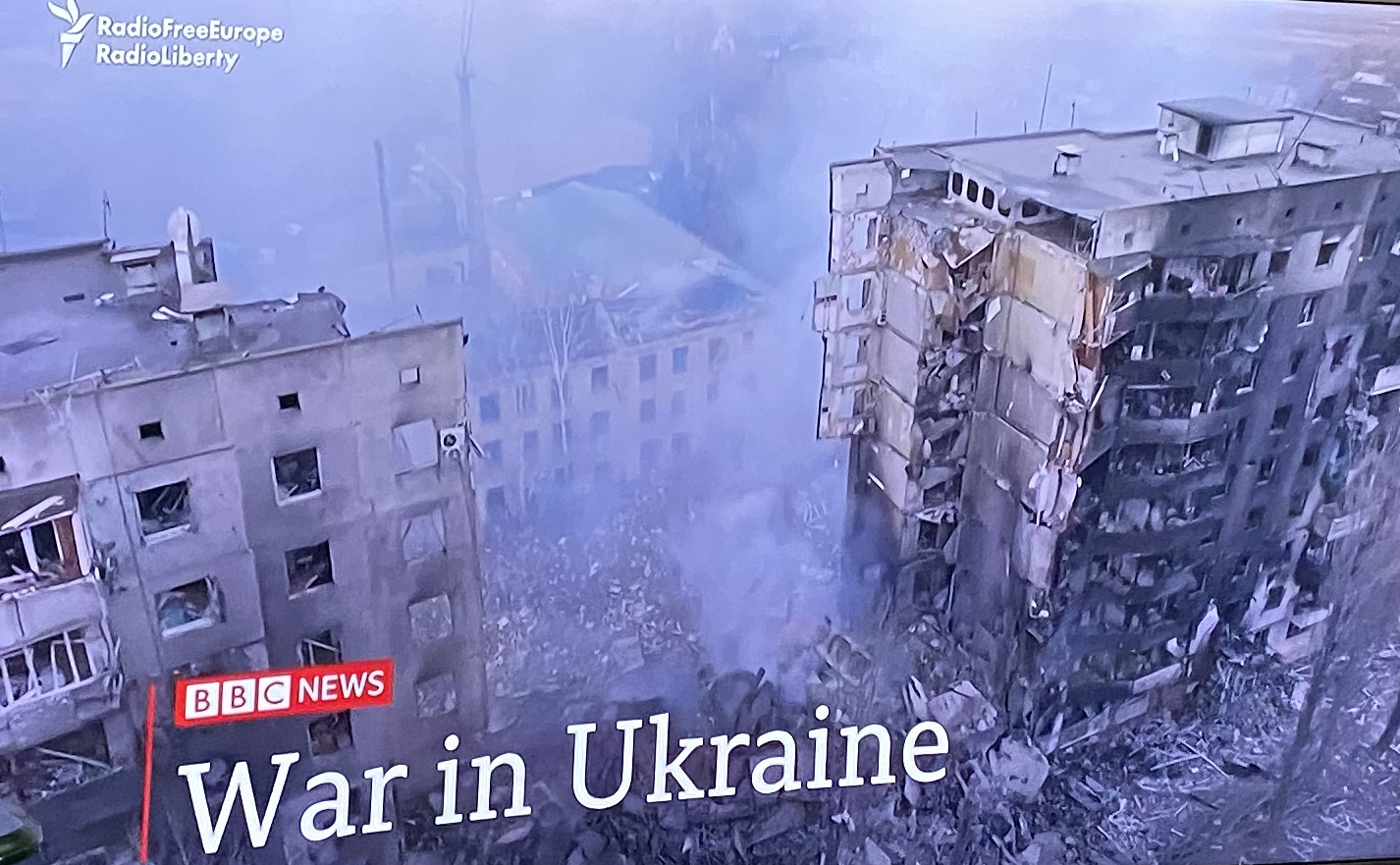Ukraine Dispatch 2 | NATO and Russia ~ The Ukraine Part II

Ukraine Dispatches
Volume 1 17 February 2022
I
I am British. I support the Union of Great Britain and Northern Ireland. Should the Scots People decide upon independence, I am too close to Scotland not to give them my full support.
I voted to remain in the EU. I accepted, immediately, the will of the nation’s majority.
Today, however, I am fervently outside the EU.
I remember as a young adult what the UK was like before we voted to join the then EEC. These last seven days have shown troubling fractures in the European Union.
The new German chancellor whose face I keep forgetting once he disappears from the television screen does not impress. How could he confidently state on NATO’s behalf that Ukraine would not be permitted to join NATO? That is not the German chancellor’s mandate. It is not within his country’s gift. It is a matter for NATO.
It is best that the German People stay out of this argument, entirely manufactured by Russia. There are too many ties to former Russia and entirely of Germany’s making, and for which the former chancellor, Angela Merkel, has much to answer. An offer of military aid to Ukraine in the form of 5,000 helmets … well, that speaks volumes.
II
It is best to reproduce, by kind permission, the excellent article by Ms Madeline Grant and its supporting editorial column in the Daily Telegraph, dated 16 February 2022.
It underscores the relief I feel deep within. Thank goodness, I am once again part of a fully independent nation and nuclear power.
III
In a separate article, the ‘i’ columnist Mark Wallace also writes that Germany is becoming an unreliable ally in the Ukraine crisis, risking damage to the West’s reputation for good.
Mr Wallace continues … that when comparing Germany’s actions, Germany’s role in this crisis has been far more deplorable. Berlin hasn’t just failed to offer serious help to Ukraine but stands accused of actively obstructing others in aiding our Eastern ally.
While NATO and the EU look at sanctions and other measures to punish Russian aggression, Berlin has spent years resisting efforts to cancel the Nord Stream 2 pipeline. In recent weeks, Germany has blocked Estonia from providing old artillery to Ukraine and even sought to prevent Kyiv from purchasing defensive anti-drone weaponry.
To justify this, German officials cite a supposedly principled avoidance of interference in conflicts “rooted in history”, given the war crimes committed in the Second World War, Mr Wallace concludes.
For a very long time, I have genuinely believed that Germany is, very firmly, a western democracy.
But its actions during the past month demonstrate that Germany remains a split personality, torn between its desire for a western lifestyle and its former GDR tie-in to Russia.
Mr Wallace continues …
At the weekend, the newspaper ‘Welt am Sonntag’ revealed that in 2020 alone Germany approved the export of “dual use” items – goods that can be used for military or civilian purposes – to Russia to the value of over €360m, (£300m) despite EU sanctions.
How odd that this policy of non-intervention is so strict when it comes to leaving Ukraine unarmed in the face of Russian aggression, but so lax when it is German companies selling militarily useful exports to the aggressor. What must happen before Berlin will choose to be a reliable ally, and live up to its responsibilities to keep tyrants in check?
Simply put, that is scandalous.
I have many close friends in Germany. Germany’s position does not alter that. Neither does it prevent me from holding Germany in the searchlight beam of incandescence.
III
The spectacle of the EU’s genuine efforts at shuttle diplomacy was brought sharply into focus yesterday when Mr Putin met with his opposite number, Mr Alexander Lukashenko of Belarus.
A press photo showed the two leaders on either side of a coffee table.
Fast rewind to the respective meetings by Mr Putin with his opposite numbers Mr Emmanuel Macron of France and Mr Olaf Scholz, both deliberately humiliated by being socially distanced at the end of a very long banqueting table.
It is a pity that Emmanuel Macron, faced with that scenario, did not simply thank Mr Putin, wish him well, and promptly turn his heel and return to his plane without ever taking his seat. That would have spoken far more to Mr Putin.
As for Mr Scholz … well, bearing in mind what his country did, historically, to Russia on the morning of 22 June 1941, then he is the least qualified to speak to the Russian President about the latter’s threats to invade a sovereign nation. Mr Scholz should keep schtum.
After the Merkel Era, Germany has much to learn about how it conducts itself on the world stage. We have a resurgent NATO after it was almost torpedoed by Donald Trump. If God forbid, that man is returned by a MAGA-craving electorate, Trump will be like a nuclear explosion on the world stage. Tyrants warm to tyrants. Trump is a tyrant. His wife informs the media that her husband’s favourite book is Mein Kampf the uncensored version.
The European Union is, as is highlighted by the following article by Madeline Grant, in no position to play the global role. Thank goodness, the United Kingdom has cut loose its EU shackles.
19 February 2022
All Rights Reserved
© Kenneth Thomas Webb 2022
Daily Telegraph Article page 18 Wednesday, 16 February 2022
The EU Deserves Never To Recover After Its Terrible Betrayal of Ukraine
by
Madeline Grant
Brussels purports to be a global power, but this crisis has shown that it's a broken Empire devoid of morality.
Crisis doesn't shape character; it reveals it. And so it has been with the European Union and its handling of events in Ukraine. [For] Vladimir Putin this motivation is maybe mainly unclear, but regardless of whether the ongoing military escalations on the Ukrainian border are the preamble to a full-scale invasion or maybe some stress test of Western resolve, there is no doubt that's the EU's reaction has been found wanting.
The block has emerged as fractured to an almost pathetic degree; unable to agree on military support or economic sanctions, divided between bilateral and multilateral modes of engagement. While Poland and the Baltic states offer Ukraine military equipment and France makes its owner of the chores to Vladimir Putin, Germany’s response has been a mixture of isolation – in its "strategic ambiguity" on sanctions and the future of Nord Stream 2 - and outright conciliation, as exemplified by its embarrassing, and tellingly symbolic, offer to send Ukraine just 5,000 helmets instead of weapons last month.
Ukraine has highlighted other historic Achilles’ heels too; a deplorable lack of investment by EU members in their own defence capabilities; the distinct reluctance of Germany and other member states to end their reliance on Russia for energy; Italy’s cosy commercial ties with Moscow, and much more. As it turns out, there is nothing like a crisis on its external border to expose the EU’s internal dysfunctions.
Some will doubtless point to the crisis in Ukraine as an argument for some kind of EU army – but the question must be: would it even be possible to organise one given the evident lack of unity displayed by member states? And if such an army existed, whose side would it be on anyway?
At best, despite their pretence at being a "global power", the EU institutions themselves can be said to be an irrelevance. European leaders, reportedly impressed by Westminster’s handling of recent events, are said to be planning to invite Britain to lead a new security committee to discuss geopolitical challenges. The move seems as much an admission of EU failure as a recognition of British diplomatic genius. In an emergency taking place in a country that borders a number of EU member states, which itself aspires to EU membership, shouldn't Brussels have been the convenor?
The greatest irony of the EU’s craven response to Ukraine is that the country that most wanted to be European has been failed by Europe. When Ukrainian activists flocked to Kyiv's Independence Square in 2013 for the protests that would lead to its democratic revolution, they carried EU flags and appealed to "European" virtues – modernity, the rule of law, democracy, freedom. Brussels loved waxing lyrical about these values too, yet it is the people of Ukraine, in neither NATO nor the EU, who now stand ready to pay the ultimate price [in order to] defend them.
Of course, establishing a cogent foreign policy among 27 members with conflicting aims and priorities was never going to be an easy task, but this was always Europe's much-vaunted dream – using a muscular EU and the solidarity of its supposedly close-knit member states to maintain stability. Indeed, this heart-warming fiction secured it the Nobel Peace Prize a decade ago. Yet when the chips are down, it's clear that national self-interest and the individual weaknesses of those member states will always trump everything else - and it's not the first time the EU has been so exposed.
During the financial crisis, it's obvious that the euro is not a sensible step on the path to economic convergence, but an ideological project that would sacrifice notions of solidarity and humanity on the altar of economic dogma. To this day, Greece bears the scars of the misuse of the EU’s institutions to enforce the will of the stronger powers, and request to push wildly different national economies into the straitjacket of monetary union. Greece’s accession to the single currency may have required industrial levels of creative accounting to mask the scale of its debts, but Eurostat merrily rubber-stamped it, and Greek GDP has never recovered from the experience.
Then came the pandemic. Slow to start and over-centralised, the Continent’s vaccine rollout showcases the very worst aspects of the EU project: the deficiencies of the technocracy and its sluggishness in responding quickly to new events. Self-interest prevailed, as when Berlin put in orders for extra doses of the Pfizer vaccine even as it trumpeted the virtues of common purchasing strategy while serving as rotating president of the European Union.
But perhaps most damaging of all was the bloc’s toxic row with AstraZeneca, which exposed a vicious nationalism that should have destroyed the EU's reputation as a force for good on the world stage.
First, European leaders including Macron and Merkel openly disparaged the safety of the one vaccine which the developing world can afford. Nearly a dozen countries curtailed the vaccine’s use across Europe after a single study revealed the vanishingly small possibility that its recipients could develop blood clots. With breath-taking hypocrisy, EU leaders then complained they had not received enough doses of the vaccine whose distribution they themselves had delayed and imposed export bans on AstraZeneca factories.
It is hard to measure the global reputational damage to the EU of all this, but Sir John Bell, the vaccine tsar who helped broker the deal between Oxford and AstraZeneca, recently said that the European leaders’ rhetoric was probably responsible for "hundreds of thousands of deaths".
Bullying yet toothless, simultaneously impulsive and sluggish –the imperial EU has failed on its own terms. Yet instead of sticking to narrow and more achievable geopolitical aims, such as free trade and cooperation, Eurocrats seem to specialise in overreacting to petty infringements: just compare their relaxed attitude to Ukrainian border tensions with their policing of the Northern Irish border.
When desperate to save face or simply vent their bitterness, they react like lightning. But when it's time to defend their own lofty principles, they respond with a deafening silence.
Putin has exposed the West’s weakness
End of Ms Madeline Grant’s Article
Daily Telegraph ~ Editorial column
Boris Johnson said yesterday (15 February) that the Kremlin was sending out mixed signals. That is putting it mildly. In the morning, the Russian military announced that some troops had begun returning to their bases from the Ukrainian border, though NATO said there was no sign of de-escalation on the ground. The Russian Parliament voted in favour of recognising the separatists in eastern Ukraine, though Vladimir Putin indicated that he would not do so yet. At a press conference with the German Chancellor, Mr Putin said that he was ready to go down the track of negotiations, though past experience suggests that little the Kremlin says should be believed.
It is incontrovertible, however, that Mr Putin has tested the West’s resolve and found it wanting.
Whatever happens in the next few days, the EU’s pretensions to having a foreign policy role have been exposed as baseless. European leaders have been hopelessly split, with some favouring a policy tantamount to appeasement of Moscow and others seeking to support Ukraine's right to self-determination. The United States has been rhetorically robust but has been prepared to do little apart from warning of devastating sanctions in the event of an invasion – sanctions that the Kremlin claims not to fear.
The irony is that Mr Putin is not as strong as he purports to be. His nation is declining economically and demographically compared with the rest of the world. His aggression has had the effect of pushing several of his neighbours closer to the West. It is only the strength of the Russian military, alongside the Kremlin’s reckless disregard for international norms, that forces the democratic world to take him seriously.
Nevertheless, even now, Mr Putin can claim to have won a victory of sorts. Aside from splitting the West, there seems to be no prospect of Ukraine joining NATO in the foreseeable future. Kyiv has seen how little its allies are really prepared to do to support it, and its economy has been further damaged by the fear of war.
Worse, there seem to be few signs that anyone is willing to fix the vulnerabilities that have enabled Mr Putin to intimidate the West. Nord Stream 2 is still set to open. NATO members are still investing too little in their own defence. Western Publics still lack the stomach for a confrontation with the forces of authoritarianism. Even if the conflict is averted now, what is to stop the Kremlin from trying this trick all over again?
At present, not very much.
End of the Daily Telegraph editorial comment.
Ken Webb is a writer and proofreader. His website, kennwebb.com, showcases his work as a writer, blogger and podcaster, resting on his successive careers as a police officer, progressing to a junior lawyer in succession and trusts as a Fellow of the Institute of Legal Executives, a retired officer with the Royal Air Force Volunteer Reserve, and latterly, for three years, the owner and editor of two lifestyle magazines in Liverpool.
He also just handed over a successful two year chairmanship in Gloucestershire with Cheltenham Regency Probus.
Pandemic aside, he spends his time equally between his city, Liverpool, and the county of his birth, Gloucestershire.
In this fast-paced present age, proof-reading is essential. And this skill also occasionally leads to copy-editing writers’ manuscripts for submission to publishers and also student and post graduate dissertations.





